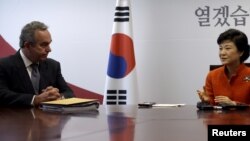A senior U.S. diplomat says Washington is pushing hard for tough international sanctions against North Korea following its successful long-range rocket launch last month.
Wednesday, Assistant Secretary of State Kurt Campbell told reporters in Seoul that he anticipates formal steps by the United Nations Security Council in the immediate future.
"We are in the midst of really rather intense deliberations in New York in the Security Council led by our Ambassador Rice," he said. "We are in very close consultation with the South Korean government about those deliberations. I think we have their understanding about the way forward and I think you will see more developments in the days ahead."
Campbell, the top American envoy to Asia, also warned North Korea against taking any more "provocative" steps, amid speculation that Pyongyang is preparing to conduct a nuclear test.
"We are very clear in our position that provocative steps are to be discouraged," he said. "We are closely working with the key players, including South Korea, at the U.N. with respect to our diplomacy after the missile test late last year."
Recent satellite images show increased activity at a North Korea nuclear test site, raising fears it may follow up its December rocket launch with a nuclear test, as it did in 2006 and 2009.
The Security Council condemned the rocket launch as a violation of existing sanctions barring North Korea from conducting ballistic missile tests.
But the U.S. and its allies have not yet been able to succeed in tightening the international sanctions, in part because of opposition from Pyongyang's main ally, China.
Cambell's trip does not include a visit to China and he did not discuss Beijing's involvement in the discussions. But, he later met with South Korean President-elect Park Geun-hye to discuss a range of issues, including regional security.
Park, who has taken a cautious-but-tough approach to North Korea, says she has accepted an invitation by President Barack Obama to visit Washington, saying she looks forward to building up a good relationship of mutual trust with the White House.
Wednesday, Assistant Secretary of State Kurt Campbell told reporters in Seoul that he anticipates formal steps by the United Nations Security Council in the immediate future.
"We are in the midst of really rather intense deliberations in New York in the Security Council led by our Ambassador Rice," he said. "We are in very close consultation with the South Korean government about those deliberations. I think we have their understanding about the way forward and I think you will see more developments in the days ahead."
Campbell, the top American envoy to Asia, also warned North Korea against taking any more "provocative" steps, amid speculation that Pyongyang is preparing to conduct a nuclear test.
"We are very clear in our position that provocative steps are to be discouraged," he said. "We are closely working with the key players, including South Korea, at the U.N. with respect to our diplomacy after the missile test late last year."
Recent satellite images show increased activity at a North Korea nuclear test site, raising fears it may follow up its December rocket launch with a nuclear test, as it did in 2006 and 2009.
The Security Council condemned the rocket launch as a violation of existing sanctions barring North Korea from conducting ballistic missile tests.
But the U.S. and its allies have not yet been able to succeed in tightening the international sanctions, in part because of opposition from Pyongyang's main ally, China.
Cambell's trip does not include a visit to China and he did not discuss Beijing's involvement in the discussions. But, he later met with South Korean President-elect Park Geun-hye to discuss a range of issues, including regional security.
Park, who has taken a cautious-but-tough approach to North Korea, says she has accepted an invitation by President Barack Obama to visit Washington, saying she looks forward to building up a good relationship of mutual trust with the White House.
Some information for this report was provided by AP, AFP and Reuters.
